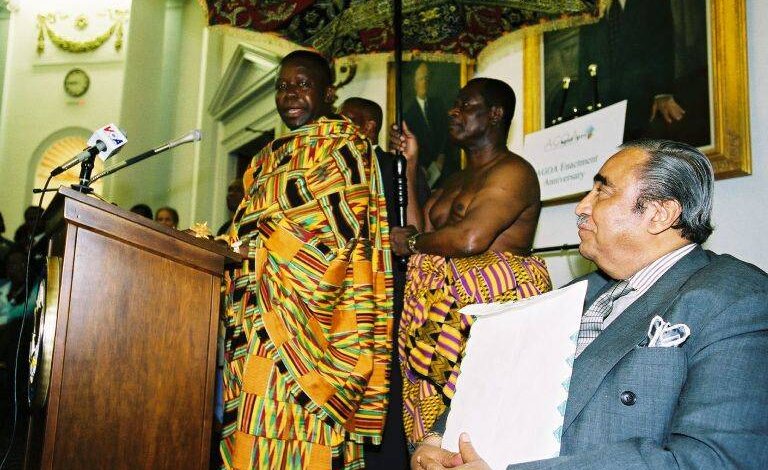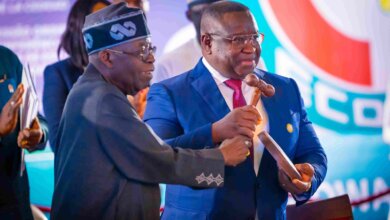Honouring Congressman Charles Rangel’s contributions to Africa

Photo: Congressman Charlie Rangel (in suit) and the Bipartisan Congressional Caucus on Africa Pay Tribute to the Asantehene, His Royal Highness Otumfuo Osei Tutu II in the US Congress / © The Whitaker Group
As the world pauses to reflect on the legacy of Congressman Charles B. Rangel who passed away on May 26, 2025, at the age of 94, one truth shines through with clarity, which is few American lawmakers have left as profound and personal a mark on the African continent as he did.
With a legislative career spanning over four decades, the longtime U.S. Congressman from Harlem, New York was committed to justice, trade equity, and African empowerment, forming a powerful legacy that transformed lives across the continent and redefined the U.S.-Africa relationship.
Rangel was a towering figure in American politics, serving 46 years in the U.S. House of Representatives from 1971 to 2017. He was a founding member of the Congressional Black Caucus and the first African American to chair the influential House Ways and Means Committee.
A decorated Korean War veteran, Rangel received the Purple Heart and Bronze Star with Valour for his military service. His legislative career was marked by a steadfast commitment to civil rights, economic justice, and the empowerment of underserved communities.
AGOA: A lifeline for African trade and jobs
At the heart of Rangel’s Africa-centered legislative portfolio was his tireless support for the African Growth and Opportunity Act (AGOA). As a leading architect and unflinching champion of the law, Rangel recognized early the potential of trade as a powerful lever for African development.
Enacted in 2000, AGOA opened U.S. markets to thousands of African goods, enabling eligible sub-Saharan African countries to export over 6,500 products duty-free to the United States. Since its passage, AGOA has helped generate hundreds of thousands of direct jobs across Africa, spurred regional manufacturing, and catalysed growth in sectors from textiles to automotive components.
Under AGOA, cumulative duty-free African exports to the U.S. have surpassed $500 billion, empowering businesses and improving livelihoods. Rangel was not just a supporter, but a legislative force ensuring its reauthorization and expansion, while fighting to give African economies space to grow on the global stage.
A voice against apartheid
Years before global consensus fully converged on ending apartheid in South Africa, Rangel took a courageous stand. As a senior member of the House Ways and Means Committee, Rangel supported amendments to eliminate or reduce tax advantages for U.S. companies doing business in South Africa. It was referred to as the double-taxation amendment.

One such measure involved denying foreign tax credits to companies that claimed taxes paid to the apartheid South African government, reducing the financial attractiveness of operating there. Rangel argued that American taxpayers should not indirectly subsidize apartheid through corporate tax breaks.
He stated that U.S. tax policy should align with American values, not support regimes that practice racial oppression. These tax policy shifts, alongside divestment campaigns and sanctions like the Comprehensive Anti-Apartheid Act of 1986, which Rangel also supported, formed part of a coordinated economic strategy to pressure the apartheid government.
This economic lever, part of the broader sanctions movement, significantly increased the cost of doing business under apartheid and hastened its collapse, positioning Rangel as a principled freedom fighter.
Elevating Africa’s voice in Washington
After becoming Chairman of the powerful House Ways and Means Committee, Rangel ensured that Africa was no longer a footnote in U.S. economic and trade policy. He helped convene the first-ever Congressional hearing featuring African private sector leaders in the 1990s, including a then-rising Nigerian entrepreneur named Aliko Dangote.
That hearing was more than symbolic, it was a deliberate shift in narrative, recognizing African business leadership and economic dynamism. He also co-founded and co-chaired the bipartisan Congressional African Caucus, nurturing cross-party commitment to the continent. His efforts expanded aid, trade, and security frameworks between the U.S. and Africa.
Rangel’s dedication was not confined to Capitol Hill. He led multiple Congressional delegations to African nations, building enduring relationships with presidents, parliamentarians, business leaders, and activists. His friendships with figures like Nelson Mandela and President Jerry John Rawlings were more than ceremonial.
They were rooted in mutual respect and a shared commitment to dignity and self-determination. Time and again, he stood in the gap for Africa, championing debt relief, public health investment, democratic reforms, and educational exchange programs.
Mentor, visionary, and builder of bridges
Among the many lives Rangel touched was that of Rosa Whitaker, a trailblazing trade strategist who would go on to serve as the first-ever Assistant U.S. Trade Representative for Africa. That position, housed in the Executive Office of the President, exists in large part because of Rangel’s personal advocacy.
He successfully lobbied the Clinton Administration to institutionalize Africa’s place in America’s global trade architecture, helping to launch Whitaker’s historic journey from career diplomat to influential policymaker. Today, Whitaker’s global work in advancing Africa investment and trade continue to echo the values Rangel championed: equity, empowerment, opportunity, and Africa-centered progress.
As Ghana and Africa reflect on the life of Congressman Charles Rangel, we remember a man who fought for African dignity in the halls of American power. A man who saw the continent not through the lens of pity, but potential. A warrior of policy, a friend of freedom, and a father of opportunity.
May his legacy inspire a new generation of leaders, on both sides of the Atlantic, to build a more just, prosperous, and united world.
Source: The Whitaker Group

Disclaimer: The views and opinions expressed in articles and content by our contributors are those of their’s and do not necessarily reflect the official policy or position of our publication. We make every effort to ensure that the information provided is accurate and up-to-date, while holding contributing authors solely responsible for their contributions.





